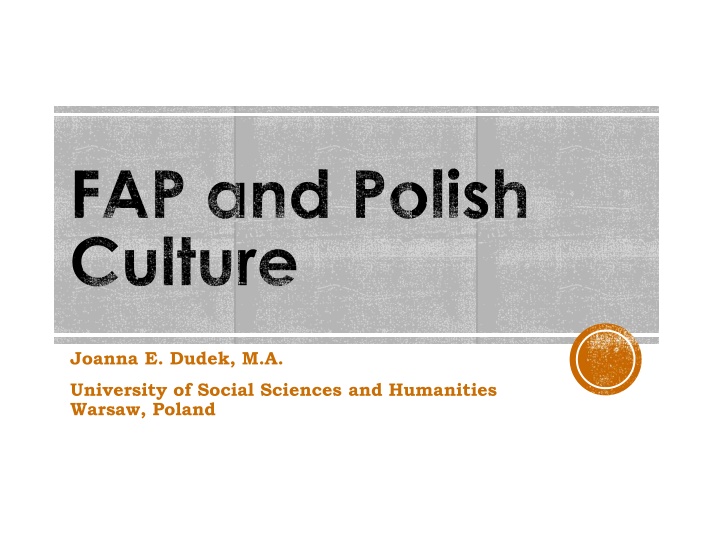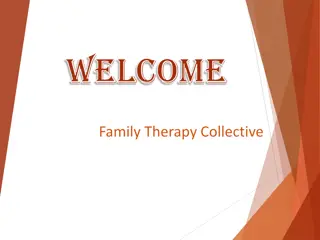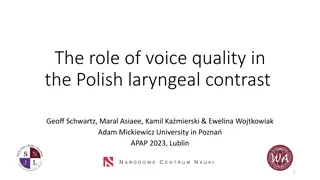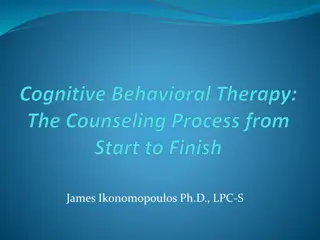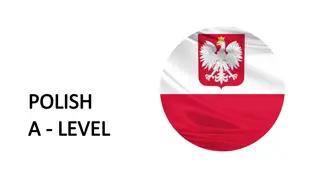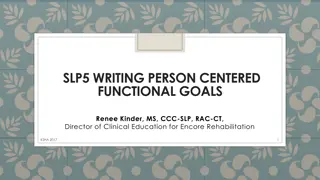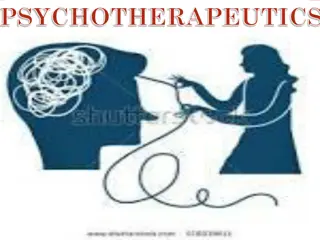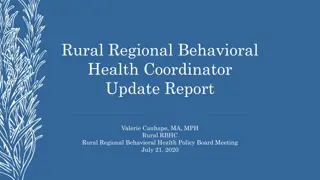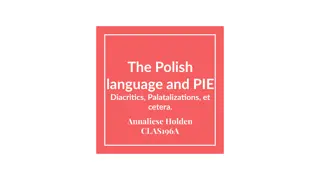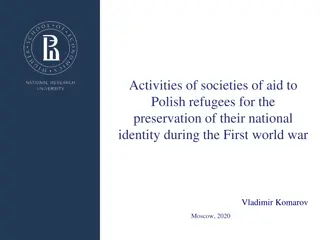Insights into Polish Culture and Behavioral Therapy: A Comprehensive Overview
Delve into the nuances of Polish culture and the status quo of behavioral therapy and psychotherapy in Poland. Learn about the history, societal influences, and perspectives shaping the Polish identity. Explore the impact of past traumas on the collective psyche and understand the implications for therapists engaging in Functional Analytic Psychotherapy (FAP).
Download Presentation

Please find below an Image/Link to download the presentation.
The content on the website is provided AS IS for your information and personal use only. It may not be sold, licensed, or shared on other websites without obtaining consent from the author.If you encounter any issues during the download, it is possible that the publisher has removed the file from their server.
You are allowed to download the files provided on this website for personal or commercial use, subject to the condition that they are used lawfully. All files are the property of their respective owners.
The content on the website is provided AS IS for your information and personal use only. It may not be sold, licensed, or shared on other websites without obtaining consent from the author.
E N D
Presentation Transcript
FAP and Polish Culture Joanna E. Dudek, M.A. University of Social Sciences and Humanities Warsaw, Poland
Topics of Interest Clinical perspective: Nuances of Polish culture Scholar/researcher perspective: Status quo of behavioral therapy and psychotherapy in Poland Translation and dissemination of FAP
Nuances of Polish Culture
History that we are carrying Mother of God-Queen of Poland heroic Sacrifice yourself, be Catholic Be humble, work hard Fighting for independence for 123 years Keep your secrets at home, be careful with whom you open up But cherish close family and friends Communism 43 insurrections (uprisings) from 1600 to 1945 Second World War Boski, P. (2009). Kulturowe ramy zachowa spo ecznych. Podr cznik psychologii mi dzykulturowej. Warszawa: Wydawnictwo SWPS Academica.
Philip Zimbardo on Poles I noticed that you Poles, are often pessimistic. Recalling the terrible ghosts of the past - the communist regime, the Nazi occupation, and earlier times. Your now is contaminated with all the evil that ever happened to you. You say, we are doomed, our country, our land is cursed as if you were collectively suffering from PTSD. I call this a negative past, and from that comes your current fatalism.
Complain to connect? Wojciszke, B., & Baryla W. (2001). Polacy jako uczestnicy kultury narzekania [Poles as participants of the complaining culture]. W: J. Bralczyk i K. Mosiolek-Klosinska (red.) Zmiany publicznych zwyczaj w j zykowych [Changes in the ways of public speaking] (s. 45-64). Warszawa: Rada J zyka Polskiego przy Prezydium PAN
Implications for the FAP Therapist Trust Functional lenses Complaining to connect Complaining, prouds, speaking your Idiographic approach Available reinforcement truth
Status quo of behavioral therapy and psychotherapy in Poland
CBT in Poland Polish Association for Behavioral and Cognitive Therapies established in 1998 CBT refunded by government since 2009 Certified CBT therapists- circa 400 approximately 1 for 100,000 citizens
Behaviorism in Poland Polish Society for Behavioral Psychology, affiliated chapter of ABAI established in 2002 Number of members 44 Certified behavioral therapists -150 approximately 1 for 270,000 citizens
Clinical context of behavior analysis: Three waves of behavioral therapy The XI International Scientific Symposium of the Polish Society for Behavioral Psychology 21-22 of March, 2015
Number of Polish ACT therapists? Around 30, but the exact number is unknown
Polish ACBS chapter to be!!!
Number of Polish FAP therapists? 1
Translation MOC (power) ACL Czujno Awareness Mi o Odwaga Courage Love
Dissemination Publications No publications on FAP, one paper under review, a few pages in the chapter on behavior analysis Learning Opportunities class for students on clinical applications of behavioral psychology 16 hours
Challenges in our journey and implications/topics to research Sometimes we get biased by the idea of the culture- it doesn t work because of the culture vs because expressing love is just hard for this particular person Cultural adaptation of evoking exercises, adjusting the training (?) Reinforced by the social environment vs healthy? How to promote FAP in the general public ? What kind of language should we use? Is ACL translation acceptable? ACL survey translation Comprehensive FAP training including behavioral training or teaching FAP based on ACL model
Czasem mwisz takim jzykiem mi o ci, kt rego inni nie mog zrozumie .
Thank you! joannaedudek@gmail.com
